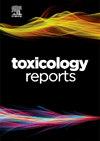Bacillus clausii spores maintain gut homeostasis in murine ulcerative colitis via modulating microbiota, apoptosis, and the TXNIP/NLRP3 inflammasome cascade
Q1 Environmental Science
引用次数: 0
Abstract
Ulcerative colitis (UC), a persistent immune-mediated disorder lacking effective treatment, is distinguished by gut microbiota dysbiosis, abnormal activation of the NLRP3 inflammasome pathway, and apoptosis. Despite growing attention to these factors, understanding their significance in UC pathogenesis remains a challenge. The present study explores the potential therapeutic impact of Bacillus clausii (Bc) spores in a murine UC model induced by drinking 4 % (w/v) dextran sulfate sodium (DSS) in C57BL/6 mice. Subsequently, the DSS-induced mice were orally administered either Bc at varying concentrations (105 and 1010 Colony forming unit, CFU) or sulfasalazine (SSZ) at a dosage of 200 mg/kg for 7 days. The disease-specific activity index (DAI) was calculated daily utilizing parameters such as body weight, diarrhea, and bloody stool. Changes in fecal Firmicutes and Bacteroidetes abundance, colonic TXNIP and NLRP3 contents, as well as colonic caspase-1, IL-1β, Bax, and Bcl-2 expression, were investigated. Additionally, markers related to oxidative stress and inflammation, histopathological changes and caspase-3 immunohistochemistry testing were conducted. DSS-treated mice had significantly higher DAI scores compared to controls, indicating severe colitis. However, SSZ treatment or Bc (105 CFU) dramatically lowered DAI scores, with the highest Bc dosage (1010 CFU) producing the greatest improvement. Furthermore, Bc (1010 CFU) substantially (p < 0.05) boosted fecal Firmicutes while decreased Bacteroidetes, indicating reversal of gut dysbiosis. Bc effectively reduced colonic oxidative stress and inflammation by replenishing GSH and catalase and modulating the NF-κB, Nrf2/HO-1, and TXNIP/NLRP3 pathways. Additionally, Bc (1010 CFU) exhibited histologically almost normal mucosa, with maintained architecture and reduced apoptosis, as seen by normalization of Bcl2 and Bax with decreased caspase-3. Collectively, these findings point to the potential usefulness of Bc spores in preventing and treating DSS-induced colitis, positioning them as a promising candidate for UC management.
克氏芽孢杆菌孢子通过调节微生物群、细胞凋亡和TXNIP/NLRP3炎性小体级联来维持小鼠溃疡性结肠炎的肠道稳态。
溃疡性结肠炎(UC)是一种缺乏有效治疗的持续性免疫介导疾病,其特点是肠道菌群失调、NLRP3炎性小体通路异常激活和细胞凋亡。尽管越来越多的人关注这些因素,但了解它们在UC发病机制中的意义仍然是一个挑战。本研究探讨了克劳梭芽孢杆菌(Bc)孢子对C57BL/6小鼠饮用4 % (w/v)葡聚糖硫酸钠(DSS)诱导的小鼠UC模型的潜在治疗作用。随后,dss诱导小鼠口服不同浓度(105和1010菌落形成单位,CFU)的Bc或剂量为200 mg/kg的磺胺吡啶(SSZ) 7天。利用体重、腹泻、便血等参数每日计算疾病特异性活动指数(DAI)。观察小鼠粪便厚壁菌门和拟杆菌门丰度、结肠TXNIP和NLRP3含量以及结肠caspase-1、IL-1β、Bax和Bcl-2表达的变化。此外,进行氧化应激和炎症相关标志物、组织病理学改变和caspase-3免疫组化检测。与对照组相比,dss治疗的小鼠DAI评分明显更高,表明结肠炎严重。然而,SSZ治疗或Bc (105 CFU)显著降低DAI评分,最高Bc剂量(1010 CFU)产生最大的改善。此外,Bc (1010 CFU)显著(p )厚壁菌门,同时减少拟杆菌门,表明肠道生态失调的逆转。Bc通过补充GSH和过氧化氢酶,调节NF-κB、Nrf2/HO-1和TXNIP/NLRP3通路,有效降低结肠氧化应激和炎症。此外,Bc (1010 CFU)粘膜组织学上几乎正常,结构维持,凋亡减少,Bcl2和Bax正常化,caspase-3减少。总的来说,这些发现表明Bc孢子在预防和治疗dss诱导的结肠炎方面的潜在作用,将它们定位为UC管理的有希望的候选者。
本文章由计算机程序翻译,如有差异,请以英文原文为准。
求助全文
约1分钟内获得全文
求助全文
来源期刊

Toxicology Reports
Environmental Science-Health, Toxicology and Mutagenesis
CiteScore
7.60
自引率
0.00%
发文量
228
审稿时长
11 weeks
 求助内容:
求助内容: 应助结果提醒方式:
应助结果提醒方式:


